The following translation from the Japanese-language autobiography entitled Aikido Jinsei (An Aikido Life) by Gozo Shioda Sensei of Yoshinkan Aikido is published with the kind permission of the author and the publisher, Takeuchi Shoten Shnisha. The series began with AIKI NEWS No. 72. Read the tenth part here.
Meeting an Old Friend in Formosa
The staff of the Embassy (of the Japanese Empire) in Formosa (present-day Taiwan) were surprised at these souvenirs of Czechoslovakian pistols, and were very pleased at our arrival, safe and sound. Mr. Uraoka was also pleased with my heroic actions—he was almost as proud as if he had done them himself. I continued to live it up, and soon had spent almost all the money I had. By the third day, I had to leave but I lacked even the traveling money to continue my journey, and was compelled to ask General Hata for some more money. He sent 300 yen, writing: “This money is the last.” I went to the Expeditionary Force in Shanghai where I picked up the money. On the fourth day, I left Shanghai, not by airplane this time, but on a small ship, called the Rozan Maru, which made the connection between Shanghai and Taiwan. After three days, the ship finally arrived at the port of Kirun, Taiwan. As the Rozan Maru docked in Kirun port, the Takasago Maru from Japan was also heading for the same quay. I glanced at the deck of the Taiasago Maru and saw Shiro Ogawa standing there. He saw me too and waved his hands. I was overcome with excitement and shouted out his name. He was my comrade in the Kobe Plot. Impatient even during the customs inspection, we were pleased with our encounter and took each other’s hands. “You actually survived the plot, didn’t you?” Ogawa said to me, struck with admiration. “You shouldn’t say such inauspicious things. I’m quite fine, without any physical injuries, as you can see.” I asked Ogawa what he really meant to say. According to his report, the civilian and the military police in Japan were frantically searching for one Shioda, a master of aikido, to arrest at the earliest possible moment. This Shioda, however, was rumored to already be in Shanghai in disguise, and was waiting for the right opportunity to assassinate Wang Ching-wei, head of the Celestial Empire. This rumor seemed to have been spread throughout Japan. Nothing is so strong as innocence, and I had not the slightest suspicion that such a story was spreading in Japan. On the contrary, I had continued to sing the joys of my youth in Shanghai, and to enjoy fully the pleasures of life, night and day. We both burst into roars of laughter. That night we stayed at an inn in Kirun and talked to each other all night. “Ogawa! Why on earth did you come to Formosa?” I asked him. “By the order of Mr. ‘I.’ After meeting with you in Taiwan, I am ordered to go to Lieutenant General Wachi with you to undertake studies of the southern countries. So I came here,” he answered me. The next day we started for Taipei together. When we arrived we went to a hotel for the night. The next morning I rang up the Headquarters of the Taiwan Army and was ordered to appear there by 10:00 a.m.. I went to see General Wachi, Chief of the General Staff at the headquarters just before 10:00 a.m. After I had waited for half an hour, I met with the General, to whom I at once handed the letter from General Hata. Needless to say, I had no way of knowing the contents of the letter, but he read through it, and said to me. “I see. I’ll have my subordinate arrange immediately for a plane to Canton.”
A Week in Canton
I had fulfilled my errand by handing the letter to General Wachi. I left alone for Canton in the morning two days later. Ogawa got a job for the time being in the Nanpo Kyokal (Southern Association) which was an association affiliated with the Taiwan Army. Its chairman was Mr. Kikuchi, a former Lieutenant General of the Japanese Imperial Army. As soon as I arrived in Canton by plane, I visited general headquarters, but unfortunately Lieutenant General Atomiya was out. I received a message to appear there by 11:00 a.m. the next morning. So I went again at 11:00 a.m. the following day. The Lieutenant General welcomed me warmly. I handed him the letter from General Hata. He said to me, “You are welcome here,” and whole-heartedly thanked me for my troubles. That night, he held a grand dinner party expressly for me. When I told him at the party that I would go next to Lieutenant General Nagai in Hanoi, he advised me, “You shouldn’t go to Hanoi now, because unfortunately there is a cholera epidemic. I will send this letter to the Lieutenant General on my own responsibility.” I willingly accepted his warm and opportune offer, handed him the letter, and asked him to send it to Hanoi. The banquet was approaching its climax, and the night wore on. I stayed that night in a hotel room reserved by the General. As the room was very good and I had a comfortable bed, I slept very soundly. I went to the headquarters again the next morning and expressed my heartfelt gratitude for his warm welcome of the previous night. “If you don’t have any urgent business, would you like to stay here for a week to do some sightseeing?” I decided to stay on his recommendation. Headquarters hired an interpreter for me, and as a result that week left me with the most impressive and tranquil memories of my eventful youth. I visited to my heart’s content the famous and historic places in and around Canton.
According to his report, the civilian and the military police in Japan were frantically searching for one Shioda, a master of aikido, to arrest at the earliest possible moment. This Shioda, however, was rumored to already be in Shanghai in disguise, and was waiting for the right opportunity to assassinate Wang Ching-wei, head of the Celestial Empire. This rumor seemed to have been spread throughout Japan. Nothing is so strong as innocence, and I had not the slightest suspicion that such a story was spreading in Japan.
Chapter Four: In the Southern Countries
I returned to Formosa at the end of August. I met at once with Lieutenant General Wachi to express my thanks, and I said to him, “I’d like to go back to General Hata in Nanking.” “Your friend, Ogawa, has enrolled in the Southern Association. Would you like to join too? Your duties would be to supervise and teach Japanese to 13 Vietnamese (who were conspiring to win Vietnam’s independence from the controlling power France) who were found in French-occupied Indochina when the Japanese Taiwan army entered there.” He urged me to work for the Southern Association. Even if I went back to Nanking, I thought, I might not be able to find an appropriate job. On top of that, if I joined, I could spend time again with my comrade, Ogawa. I decided to become a member of the group too. General Wachi told me later that in the letter General Hata had written to him, the General had asked him to make an effort to find me a job in Taiwan. “Thank you for the trouble you have taken to find me this job. Now, how can I explain this to General Hata?” I asked him. “I will explain all the details to him,” he promised. So, without the slightest anxiety, I left my future fortune in General Wachi’s hands. He immediately wrote a letter of introduction addressed to the Director General of the Southern Association. “Since I will tell him about you on the phone, you can go there whenever you like,” he told me.
Post with the Southern Association
The next day, I went to the Association where I met Mr. Kikuchi, the Director General, and was formally admitted as a member. I was to be paid 95 yen a month. Ogawa had already gone to Hokuto to teach. It took about two hours by train from Taipei to reach Hokuto, a hot spring resort town, not unlike Atami in Japan. It had a valley in which many villas of Taiwan’s richest and most famous people were located. The Formosan Army borrowed a villa from a certain influential Formosan where they housed and guarded the 13 patriots. Hokuto was also an amusement quarter. Rows of restaurants, bars, and tea houses, their red lanterns glowing seductively, beckoned young men like us to sample their delights. But in other ways, Hokuto was a really wonderful place.
That night, he held a grand dinner party expressly for me. When I told him at the party that I would go next to Lieutenant General Nagai in Hanoi, he advised me, “You shouldn’t go to Hanoi now, because unfortunately there is a cholera epidemic. I will send this letter to the Lieutenant General on my own responsibility.” I willingly accepted his warm and opportune offer, handed him the letter, and asked him to send it to Hanoi.
I went to Hokuto with high hopes and big dreams. When I met my old friend Ogawa again, I felt as happy as if I were meeting my lover. He was also pleased. We talked and drank sake till late at night. As he described it, the substance of my work was less difficult than I had imagined, and I would be able to perform my duties easily. We got up every morning at 7:00 a.m. and after the Japanese National Flag was raised, had breakfast prepared by Vietnamese cooks. Vietnamese dishes, with red peppers in almost everything, were too spicy for me. I tried to eat, but in vain. I always left most of my meals on my plate. Japanese lessons began at 10:00 a.m. I taught them the rudiments of Japanese pronunciation, “a, i, u, e, o” until 11:30 a.m. From 2:00 until 3:30 p.m. we worked on the farm. That was our daily schedule. Ogawa and I had free time every day after 4:00 p.m. Sunday was a holiday, and the Vietnamese were permitted to go out from 8:00 a.m. to 6.-00 p.m. and do as they liked.
At a Loss at What to Do with My Money and Time
The sum of both our monthly salaries amounted to 190 yen, which was a large amount and went a considerable way in those days. I had been prudent and patient, on my best behavior, for four or five days. But the free time after 4:00 p.m. was just too long for a young man like me, and I had a large sum of money in my pocket. The enticements of pretty girls and good sake were all around me, and for several days I had only barely resisted the temptation to go to the red light district. Just when I was about to go anyway, Ogawa lured me there. He said to me, ‘’There is a small restaurant downtown which is called ‘Sarashina.’ The old master and his wife are very interesting. Would you like to go there with me just for a while?“ I agreed to his tempting offer without hesitation. We went to the Sarashina at about 7 o’clock that evening. Mr. and Mrs. Nagasaki, with their five children, three daughters and two sons, owned and operated the restaurant. They went there from Tokyo. Mr. Nagasaki was kind and generous, yet straightforward. The atmosphere in his restaurant was very comfortable and homey, so it was like an oasis for those of us who had been forced to live alone for a long time. We went to the Sarashina every night to eat and drink. After a while, Shoko, who at 16 was the eldest daughter of the family, began to fall in love with Ogawa. As time passed, they found more and more opportunities to slip out together to be alone. “Just as the cherry blossoms fall at the height of their beauty, so must I be ready to die bravely,” was the philosophy of life and death among the Japanese youth in those days. So I always said to Ogawa, “Do what you want to do, and have no regrets.”
One night, I went alone to the Sarashina and was drinking, when a geisha girl and a man who seemed to be her patron entered the restaurant. The geisha was very beautiful, but had a strong personality, and she interfered with everything he did. After a while, their voices grew louder, and soon they were arguing with each other. Suddenly the geisha threw an ashtray at her patron, and hit him hard on the forehead. Everything was in confusion as they grappled fiercely with each other, kicking and scratching. I watched their fight for several minutes, but they showed no signs of stopping, and in fact, their scuffle was escalating into rough and disorderly fighting. So, feeling indignant at their public display of violence, I decided to break it up. But then the geisha attacked me furiously. It was the only time I’ve ever been attacked by a woman. As I was young and unused to such situations, instead of evading her attack, I slapped her on the cheek, thinking of her as a “foolish woman.” I didn’t mean to slap her across the face so forcefully, but she was flung back hard against the paneling. She had drunk too much, and fell like a log unconscious. “Now, you had better go home,” I advised the man. I dashed cold water into the unconscious geisha’s face until she came to and sat up. Water was dripping from her face, and her mouth hung open in surprise. She was soaked to the skin. I scolded her and said to her, “Go home now!” and pushed her out of the Sarashina. Then I began to help the family pick up the utensils which were strewn about the room, and soon order was restored. After a while I heard someone entering the restaurant’s front door. A beautifully made-up woman greeted us gracefully. “Please, excuse my impolite behavior of earlier.” I was thoroughly surprised, because it was the geisha girl who had such a short time before been soaked. It is often said, with good reason, that women are witches. I looked closely at her face, and realized that she had good features, and was quite lovely to look at. And she had the articulate speech of a Tokyo native. Her open-hearted and generous personality seemed typical of what we called Edokko (“child of Edo,” a person born into a family living in Tokyo for more than three generations). “I thank you for your polite apology,” I replied smiling. She seemed to feel reassured at my reasonable manner and said, “I’d like to invite you to join me for a drink as a token of our first meeting.” I felt, however, a little shy, and did not want to drink with her alone, so I said to her: “I will accept your invitation if you invite the master too.” So the three of us went out for a drink.
I tried to eat, but in vain. I always left most of my meals on my plate. Japanese lessons began at 10:00 a.m. I taught them the rudiments of Japanese pronunciation, “a, i, u, e, o” until 11:30 a.m. From 2:00 until 3:30 p.m. we worked on the farm. That was our daily schedule. Ogawa and I had free time every day after 4:00 p.m. Sunday was a holiday, and the Vietnamese were permitted to go out from 8:00 a.m. to 6.-00 p.m. and do as they liked.
The house she lived in was called “Matsushima,” a restaurant and house for geisha girls in Hohuto. The master and I followed her in. She entertained us as heartily as if we were her benefactors and respectfully offered us various expensive dishes and good sake. She had married in Tokyo, and set up her own household, but her life was unhappy and she and her husband often quarreled. They were finally divorced on the grounds of incompatibility, and she came to Taiwan. With the help and advice of an old friend, she explained, she decided to become a geisha girl at the Matsushima in Hokuto. Her geisha name was Koyanagi, so we called her Koyanagi-nesan (nesan is the familiar form of address appropriate for a geisha). As she told us her story, we became truly impressed by her frank disposition because she was not pedantic and didn’t harbor any grudges. Koyanagi-nesan’s philosophy of life was simple and clear: facts were either good or evil, and she either liked or disliked something. She told me that an inspiration had struck her in the same instant that I had. “I have never been struck by a man that hard. On the contrary, the men I have associated with only desired to dally with me, and made great efforts to court me, although they were all idiots without any cleverness or sense of duty. I realized for the first time how much I indulged myself with them.” Then she said, “I must have been fated to be slapped by you. If it is possible, please be my good friend always.” I was under the influence of sake, and answered her feeling a bit vain and not altogether bad, ‘’I’ll give advice to you whenever you have difficulties.”
Afterward, Shoko and Ogawa often went out on dates, and Koyanagi-nesan invited me out to drink every night, and treated me to drinks and fine dishes at Matsushima. She had been feasting me for many days, when I finally asked, feeling a little uneasy about her purse, “Koyanagi-nesan, it must be really expensive to treat me like this every day?” But she said to me smiling, “Don’t worry about it! Everything will be paid for by my patron.” “I sympathize with your patron, but it is very, very, good that you are not paying for our luxurious banquets,” I replied. Anyway, we lived the high life, filled with delicious food and good sake.
*The above article was prepared with the kind assistance of Guy LeSieur of Montréal, Québec, Canada.*

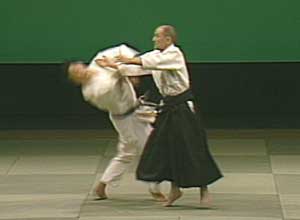

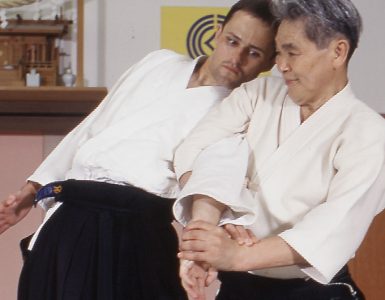
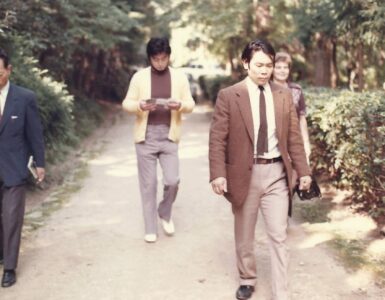
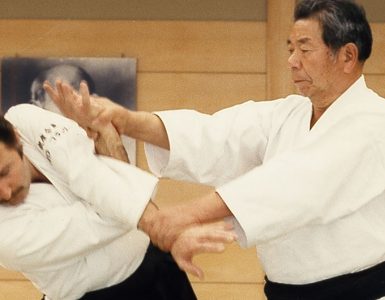

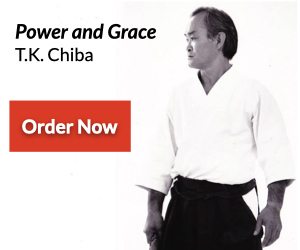





That man may have been an aikido master and I respect his work a lot, but he seems to have been most unpleasant to be around !
Based on this book and a couple other sources.